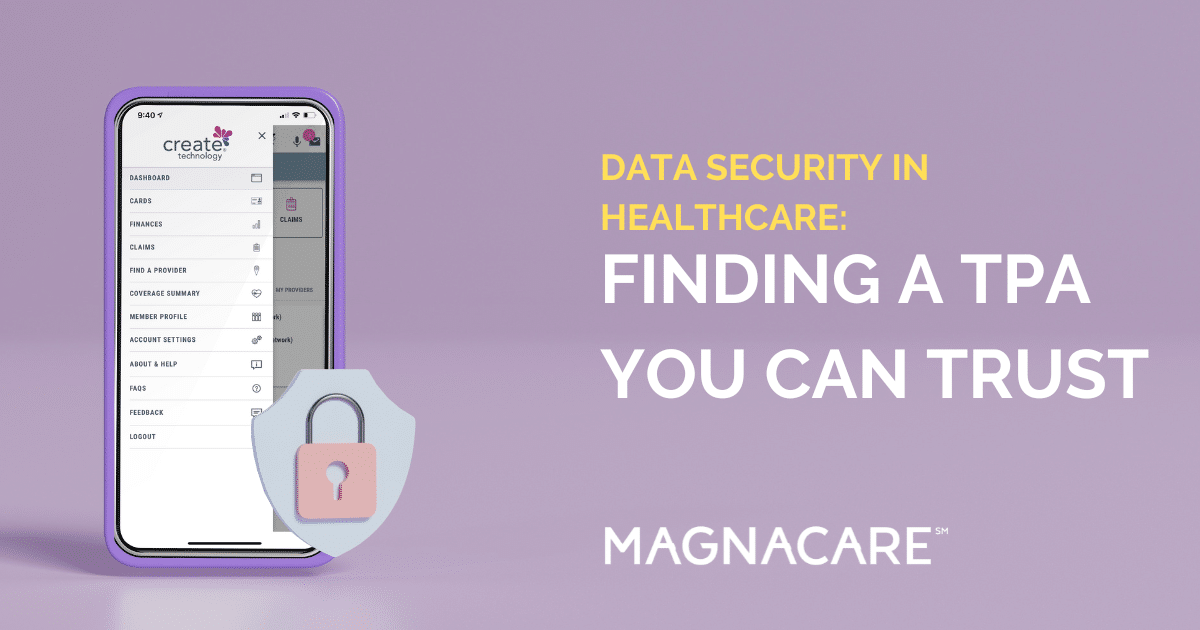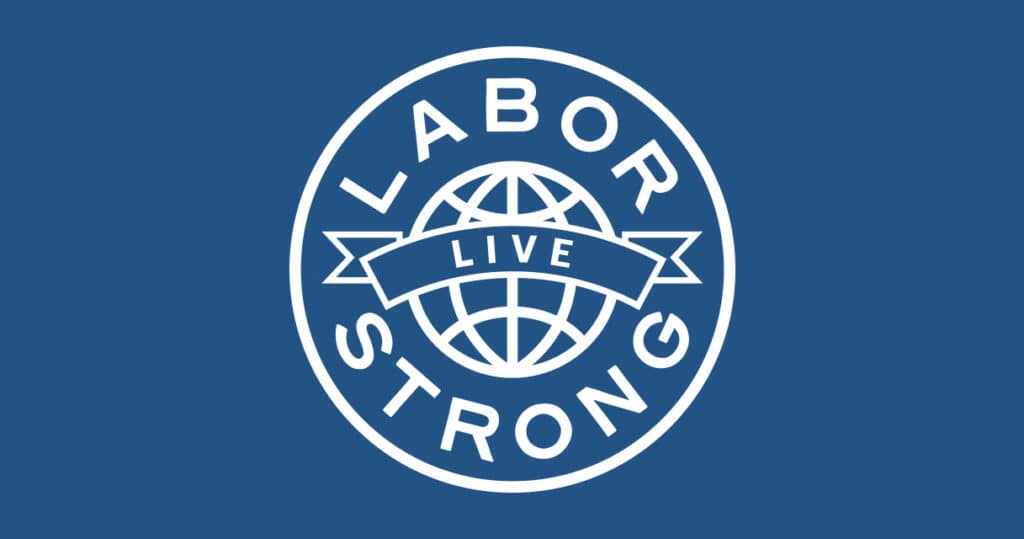Data security in healthcare: finding a TPA you can trust

Information is a hot commodity in today’s knowledge-driven economy, which is why it’s no surprise that cybercriminals are setting their sights on the healthcare industry. As a healthcare entity yourself, it’s your responsibility to keep sensitive data away from prying eyes. Easy enough, right?
Wrong. Sadly, many organizations fall short when it comes to data security. Worst of all, the problem is getting worse.
In fact, healthcare cyberattacks affected 45 million people in 2021 — triple the amount reported just three years earlier. According to Proofpoint, 89% of healthcare entities experienced an average of 43 attacks over the past 12 months, which is roughly one every week.
Could you imagine if someone tried breaking into your house once a week? Sooner or later, they just might succeed. In a nutshell, that’s why security is so important — especially in healthcare, where this hypothetical is actually happening.
Understandably, data security can be overwhelming. But we’re here to help. In this guide, we’ll walk you through all you need to understand about the healthcare cybersecurity problem and the importance of finding a third-party administrator (TPA) you can trust with your data.
Why do hackers target the healthcare industry?
It’s a good question. What is it about healthcare that attracts the attention of the world’s savviest cybercriminals?
The short answer is information. Healthcare entities — insurance brokers, providers, TPAs and third-party vendors — process a goldmine of sensitive data. In the eyes of a money-hungry hacker, that makes you a lucrative target. Consider the types of information you and other healthcare organizations routinely collect:
- Medical data: Protected health information (PHI) includes a member’s medical history, DNA samples, fingerprint records, test results, and other data relating to their health. PHI is exceptionally sensitive because it contains intimate details about members’ personal lives.
- Financial data: Billing, insurance, credit card numbers and other financial information are essential to the healthcare system.
- Personal data: Personally identifiable information (PII) refers to any data that could either directly or indirectly identify an individual member. Social security numbers, personal addresses, phone numbers and emails are all common examples of PII.
According to the Center for Internet Security, the average cost of a data breach incurred by a non-healthcare entity is $158 per stolen record. For healthcare agencies, the cost is $358.
Why? Because PHI is inherently more valuable. Hackers can use it to scam victims or even take advantage of their medical conditions or victim settlements. PHI can also be used to commit insurance fraud or obtain prescription drugs for personal use or resale.
More often than not, however, hackers steal data so they can flip it into cash. According to a Trustwave report, a single healthcare record may be valued up to $250 on the black market, compared to $5.40 for the next most valuable record.
How hackers steal your members’ data
Malicious cybercriminals have an extensive repertoire of strategies they can use to obtain sensitive information. Here are a few of the most common:
- Taking advantage of outdated systems: Obsolete or infrequently updated technology is a major vulnerability. By exploiting defense flaws and targeting known weaknesses, hackers can easily inject malware, ransomware and other viruses into the system to do their dirty work.
- Scamming unsuspecting victims: There’s a relative knowledge gap in the health sector, and hackers know it. They often exploit this lack of security training by fooling victims into divulging information over email.
- Cracking into accounts: Weak passwords are perhaps the easiest way for a hacker to compromise someone’s account. It doesn’t take much personal information for a savvy criminal to guess the right password.
What are the consequences of a data breach?
Healthcare breaches have especially devastating consequences, even more so than most other industries. Let’s dive into four of the most significant:
- Noncompliance: Healthcare companies are subject to some of the strictest information security standards and regulations in the world. A data breach could constitute a compliance violation, in which case you may be liable for hefty fines and serious legal consequences.
- Reputational damage: Word travels fast in the healthcare business. Members and partners will hear if their information is compromised. This news can not only tarnish your brand name but also permanently associate you with poor privacy and security.
- Remediation costs: Healthcare gets hit the hardest by cybercrime. In fact, the average cost of a healthcare data breach is more than $10 million. That’s twice the global average and more than any other industry. Simply put, it’s a bill you can’t afford.
- Member privacy and safety: Most important, data breaches jeopardize member well-being. According to Proofpoint, more than 20% of healthcare organizations reported increased mortality rates after experiencing a cyberattack. Delayed procedures and tests were the most common consequence, leading to longer stays and worse patient care.
What to look for in a TPA
Keep in mind that when you work with third-party vendors and TPAs, you’re also agreeing to share sensitive member information as part of that relationship.
If your partner has poor data security, they could suffer a breach, which in turn may put your members’ data at risk. This circumstance is actually common in the industry, as healthcare organizations were the most frequent victim of third-party breaches in 2022 (making up more than a third of all incidents).
So, who can you trust? Let’s discuss.
Ideally, your TPA should have a proven track record of success. More than a commitment to data security, they use a rigorously tested framework of strategies in place that proactively mitigate risk. Here are a few essential best practices you should look for in a TPA:
- Real-time monitoring: Hackers don’t take vacations. You need 24/7 assurance that your members’ information is always under lock and key. The right TPA will keep watch over data and detect anomalous behavior that could indicate an attack.
- Regular testing: You can’t “set and forget” security — you have to continuously test, evaluate and improve it. Look for a partner that doesn’t settle for good enough when it comes to your data.
- Encryption: A TPA’s job is to help you manage claims, which means data is constantly in motion. Encryption is key, as it renders information unreadable when it travels through the system.
- Business continuity planning: When risks are detected, TPAs need to be ready to jump into action at a moment’s notice. Having standardized plans in place ensures that operations continue even in face of a potential threat.
These qualities can be hard to find in a TPA. Luckily, MagnaCare already has them down pat. Not only do we help you expand your network with nationwide coverage, we also use tried-and-true best practices to make data security one of our top priorities.
Don’t let data security drag you down. With us, you can assure your members that their privacy is well-protected by a comprehensive and committed risk management framework.
Learn more about accessing the MagnaCare network today.
MagnaCare Blogs

What to Expect from the Minimum Essential Coverage (MEC) Application Process
Finding a healthcare plan for your company isn’t…
Information on Change Healthcare Cybersecurity Incident
As widely reported in the media, Change Healthcare…

